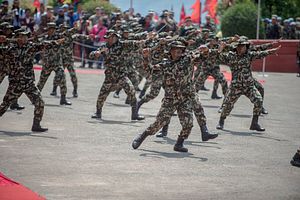The great British Empire was not built in a day. Innumerable soldiers from the Himalayan nation of Nepal have fought for the United Kingdom and the tradition continues until today. The East India Company formally recruited Nepalese soldiers who later became the infamous elite group yclept ‘Gurkhas’ in 1817 during the war of Pindaree. The Gurkhas, essentially, have served the UK for nearly two hundred years now. The lucrative recruitment, however, has resulted in deaths, migration, and, most importantly, unfair treatment.
Today, Gurkha veterans and their families (around 27,000 total) continue their struggle against the UK government for their indifferent attitude and policy. After years of protests and struggles, the UK government has increased the pension scheme for Gurkhas up to 37 percent for those who joined the service prior to 2007. But to the Gurkha’s dismay, the announcement proved to be worthless. It was rejected by the former British Gurkhas who termed it unequal compared to what other British army men receive. Meanwhile, the UK government has increased the number of new Gurkha recruits to 400 and is also spending around 25 million pounds for Gurkhas and their families over the next ten years, particularly, for their healthcare. On a bizarre note the UK government, on the other hand, has minimized defense spending and its total number of army personnel all while increasing the recruitment number for Gurkhas to 400 from 320.
On May 1, a group of 150 former Gurkha veterans staged demonstrations against the United Kingdom in Kathmandu and London simultaneously. Their only plea was for the UK government to form a high-level talk team so that issues raised by ‘The Gurkha Technical Committee’ would be resolved immediately. The veterans had submitted the tripartite committee’s report on March 22, 2019, which contained records of discrimination against them over successive years by the British government.
For two centuries, the UK government has been systematically denying equal pay, pension, and treatment to the Gurkhas in comparison their British compatriots. The discrimination against Gurkhas extends to pay during leave, pension entitlements, and goes against human rights laws and the Race Relations Acts. It was only when Britain returned Hong Kong to China in 1997 and Gurkhas moved to the southern part of the UK that the latter’s pay was finally equal that of the natives.
But things get messier for the British Gurkhas when they return to Nepal for holidays or say a break. They are only paid five percent equivalent of their salary and can only serve for a maximum of 17 years. On the other hand, British natives are allowed to serve up to 22 years while receiving a pension of 623 pounds a month. Sadly for British Gurkhas, they only got 91 pounds a month, which is around 13,000 Nepali rupees, way lower than the national minimum wage of Nepal set at 13, 450 rupees. It was worse for Gurkhas serving prior to 1975 since those who had served less than 22 years would receive no pension at all. The situation today, however, is set to change.
The UK government recently decided to increase pension payments by 10 to 34 percent for Gurkha veterans, investing 15 million pounds. This means they are set to receive 730,000 rupees per year, or around $6,513.55. In addition, the UK government has decided to provide 3.6 billion rupees to the Gurkha Welfare Trust in Nepal for Gurkha veterans’ healthcare for the next ten years.
They also have agreed to allow veterans with more than four years of service prior to 1997 to settle in the UK and get access to medical support and welfare. The UK government takes its stance on the idea that Gurkhas soldiers agreed to their terms and conditions prior to 2007 like their British compatriots. But the idea is not only fallacious but disregards the sacrifices of the Gurkha regiment and the soldiers who often come from poor families in Nepal, hoping to lift their family and themselves up from poverty.
Nepal’s elite Gurkha soldiers continue their struggle against the United Kingdom today, but there’s no sign that the latter will make concessions. The stakes are high for both sides, however, with Britain reeling from Brexit and nostalgia for its sunken empire.
Gurkha veterans have made it clear that if the issue is not resolved, then they are going to disrupt Gurkha recruitment in Nepal and reject the recent support package by the UK government, terming it as unsatisfactory and unfair.
Meanwhile, young prospective British Gurkhas in Nepal spend their youth, energy, and at times around two million rupees to secure their place in the elite regiment. Needless to say, they also have to spend on admission fees and lodging.
In a recent visit to the United Kingdom, Nepali Prime Minister K.P. Oli had proposed a review of the 1947 tripartite agreement between Nepal, India, and Britain. But the statement from 10 Downing Street had no mention whatsoever about the issue. Oli said that the UK government did not accept the proposal.
On July 1, the deadline set by the Gurkha veterans expired, with hopes that Nepal and the British government would address their needs and come to a conclusion. The Gurkhas have, for now, temporarily halted their campaign after the UK government assured speedy changes.
Arun Budhathoki is a freelance journalist based in Kathmandu. He’s the editor-in-chief with Kathmandu Tribune. His works have appeared in India Today, The Huffington Post (India), Daily O, The Citizen (India), Republica, The Kathmandu Post, and Asia Pacific Daily.

































